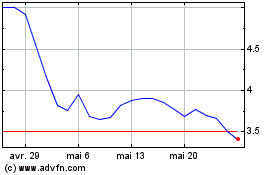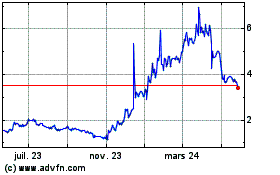Aileron Therapeutics (Nasdaq: ALRN), a chemoprotection oncology
company focused on fundamentally transforming the experience of
chemotherapy for cancer patients, today presented detailed results
from its completed Phase 1 study of ALRN-6924 in healthy volunteers
at the EORTC-NCI-AACR International Conference on Molecular Targets
and Cancer Therapeutics 2022 taking place in Barcelona October 26 –
28, 2022. The poster titled, “ALRN-6924 Induces Cell Cycle Arrest
in Bone Marrow Stem Cells and Hair Follicles with Dose-Dependent
Degree and Duration of Effects after a Single Infusion in Healthy
Volunteers” (Poster #136) is also available in the Scientific
Resources section of Aileron’s website linked here.
ALRN-6924 is a first-in-class MDM2/MDMX dual inhibitor that is
currently in development as a novel, selective chemoprotective
agent for patients with p53-mutated cancer. The findings presented
at the EORTC-NCI-AACR conference, which showed that ALRN-6924
induced p53-mediated cell cycle arrest in bone marrow stem cells
and hair follicles, demonstrate the potential of ALRN-6924 to
prevent chemotherapy-induced neutropenia, thrombocytopenia, and
anemia, as well as chemotherapy-induced alopecia.
“While we previewed some of these new findings from our now
completed Phase 1 study of ALRN-6924 in healthy volunteers earlier
this year, we’re pleased to present the comprehensive results at an
international scientific conference,” said Manuel Aivado, M.D.,
Ph.D., President and Chief Executive Officer at Aileron. “These
results contribute to the substantial body of scientific evidence
that we believe has reliably and reproducibly demonstrated
ALRN-6924’s potential as a biomarker-driven chemoprotective agent,
driving us to work diligently to address the significant impact
chemotherapy-induced toxicities have on cancer patients’ treatment
experience and outcomes.”
ALRN-6924 is designed to activate p53, which in turn upregulates
p21, a known inhibitor of the cell replication cycle, thereby
inducing cell cycle arrest to protect normal, healthy cells from
chemotherapy-induced damage. The Phase 1 study in healthy
volunteers was conducted to evaluate the safety, tolerability,
pharmacokinetics (PK), and pharmacodynamics (PD) of ALRN-6924.
Aileron previously presented data from the study showing that a 0.3
mg/kg and 0.6 mg/kg 1-hour intravenous (IV) ALRN-6924 infusion was
well tolerated, and transiently upregulated p21 in human bone
marrow cells with minimal signal for apoptosis (n=37; Voors-Pette
et al., ESMO 2021).
In the new findings presented today, cell cycle arrest was
directly measured in the bone marrow and hair follicles of an
additional 41 females. ALRN-6924 was administered as a single
1-hour IV infusion or 3-minute bolus injection at 0.3, 0.6, or 0.9
mg/kg to cohorts of 3 to 9 subjects and compared to placebo. Plasma
and serum samples were obtained to determine PK and levels of
macrophage inhibitory cytokine-1 (MIC-1), a biomarker of p53
activation. Bone marrow was sampled 12 hours post-dose to directly
measure cell cycle arrest by flow cytometry in CD34+,
lineage-negative bone marrow stem cells. Occipital scalp skin was
sampled by a 2 mm punch biopsy for p21 immunohistochemistry in hair
follicles.
In addition to the cell cycle arrest findings, ALRN-6924
continued to demonstrate a favorable tolerability profile, with
subjects experiencing only mild, transient adverse events (AEs),
with nausea/vomiting as the most frequent related AE. The degree
and duration of serum MIC-1 elevation was dose-dependent,
indicating more durable p53 activation at higher ALRN-6924 doses.
At 12 hours post-dose, the proportion of cycling bone marrow stem
cells was significantly reduced at all dose levels. Blinded
pathology review suggested ALRN-6924-dependent p21 induction in
anagen-phase hair follicles. Safety profiles, PK and PD were
similar for both the 3-minute bolus and 1-hour infusion, providing
rationale for future development of ALRN-6924 bolus
administration.
“These findings are particularly compelling as they support our
selection of the 1.2 mg/kg dose for our ongoing Phase 1b trial in
patients with p53-mutated breast cancer, as well as our evaluation
of protection against both chemotherapy-induced neutropenia and
alopecia in that trial,” said Allen Annis, Ph.D., Senior Vice
President, Research at Aileron. “Beyond informing the dose and
schedule for our current trial evaluating ALRN-6924 in breast
cancer patients being treated with docetaxel, doxorubicin and
cyclophosphamide, or TAC, these results suggest this dosing regimen
can be uniformly applied when developing ALRN-6924 as a
chemoprotective agent with other chemotherapies and for patients
with other p53-mutated cancer indications.”
About Aileron Therapeutics
Aileron is a clinical stage chemoprotection oncology company
that aspires to make chemotherapy safer and thereby more effective
to save more patients’ lives. ALRN-6924, our first-in-class
MDM2/MDMX dual inhibitor, is designed to activate p53, which in
turn upregulates p21, a known inhibitor of the cell replication
cycle. ALRN-6924 is the only reported chemoprotective agent in
clinical development to employ a biomarker strategy, in which we
exclusively focus on treating patients with p53-mutated cancers.
Our targeted strategy is designed to selectively protect multiple
healthy cell types throughout the body from chemotherapy without
protecting cancer cells. As a result, healthy cells are spared from
chemotherapeutic destruction while chemotherapy continues to kill
cancer cells. By reducing or eliminating multiple
chemotherapy-induced side effects, ALRN-6924 may improve patients’
quality of life and help them better tolerate chemotherapy.
Enhanced tolerability may result in fewer dose reductions or delays
of chemotherapy and the potential for improved efficacy.
Our vision is to bring chemoprotection to all patients with
p53-mutated cancers, which represent approximately 50% of cancer
patients, regardless of type of cancer or chemotherapy. Visit us at
aileronrx.com to learn more.
Forward-Looking Statements
Statements in this press release about Aileron’s future
expectations, plans and prospects, as well as any other statements
regarding matters that are not historical facts, may constitute
forward-looking statements within the meaning of The Private
Securities Litigation Reform Act of 1995. These statements include,
but are not limited to, statements about the potential of ALRN-6924
as a chemoprotective agent and the Company’s strategy and clinical
development plans. The words “anticipate,” “believe,” “continue,”
“could,” “estimate,” “expect,” “intend,” “may,” “plan,”
“potential,” “predict,” “project,” “should,” “target,” “would” and
similar expressions are intended to identify forward-looking
statements, although not all forward-looking statements contain
these identifying words. Actual results may differ materially from
those indicated by such forward-looking statements as a result of
various important factors, including whether Aileron’s cash
resources will be sufficient to fund its continuing operations for
the periods anticipated or with respect to the matters anticipated;
whether initial results of clinical trials will be indicative of
final results of those trials or results obtained in future
clinical trials, including trials in different indications; whether
ALRN-6924 will advance through the clinical trial process on a
timely basis, or at all; whether the results of such trials will be
accepted by and warrant submission for approval from the United
States Food and Drug Administration or equivalent foreign
regulatory agencies; whether ALRN-6924 will receive approval from
regulatory agencies on a timely basis or at all or in which
territories or indications ALRN-6924 may receive approval; whether,
if ALRN-6924 obtains approval, it will be successfully distributed
and marketed; what impact the coronavirus pandemic may have on the
timing of our clinical development, clinical supply and our
operations; and other factors discussed in the “Risk Factors”
section of Aileron’s annual report on Form 10-K for the year ended
December 31, 2021, filed on March 28, 2022, and quarterly report on
Form 10-Q for the quarter ended June 30, 2022, filed on August 15,
2022, and risks described in other filings that Aileron may
make with the Securities and Exchange Commission. Any
forward-looking statements contained in this press release speak
only as of the date hereof, and Aileron specifically disclaims any
obligation to update any forward-looking statement, whether because
of new information, future events or otherwise.
|
Investor Contact: |
Media Contact: |
| Stern Investor Relations |
Liz Melone |
| Alexander Lobo |
lmelone@aileronrx.com |
| alex.lobo@sternir.com |
|
| |
|
Aileron Therapeutics (NASDAQ:ALRN)
Graphique Historique de l'Action
De Jan 2025 à Fév 2025

Aileron Therapeutics (NASDAQ:ALRN)
Graphique Historique de l'Action
De Fév 2024 à Fév 2025


